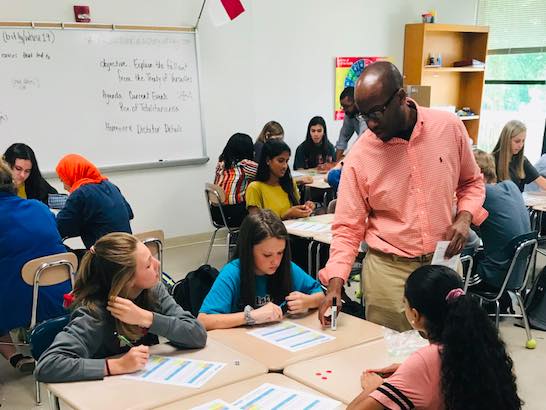


Charlie Shaw and Champ Gupton, both technology commercialization managers in the UNC Office of Technology Commercialization (OTC), recently made science class a little bit cooler for local high school students.
Shaw and Gupton – both scientists who work with Carolina faculty to help them turn inventions into valuable products and services – visited Athens Drive Magnet High School in Raleigh to participate in NC DNA Day. While there, they worked with students on activities designed to increase their understanding of antibiotic resistance and immunity – and pique their interest in scientific research in general.
NC DNA Day is an annual event that brings together scientists from North Carolina’s leading research universities and institutions and connects them with high school students interested in science and biology.
We caught up with Shaw to learn more about the experience of collaborating with students and introducing them to potential career opportunities in genetics, genomics and biotechnology.
Tell us how you became involved with NC DNA Day. I noticed an e-mail advertisement from Patrick Brandt, PhD (Director of Career Development and Outreach, Office of Biomedical Graduate Education, UNC-Chapel Hill). I truly value exposing youth to STEM and wanted to participate.
Why is it important for experts at universities to connect with high school students? Students need to learn science isn’t just in a book or displayed on a few channels on TV. But that everyday people who enjoy knowing about the world around them can become scientists and research things that they’re are passionate about uncovering.
What do you think the students learn? We completed a module on immunity. Students learned about drug resistance and hopefully about the importance of taking the full course of antibiotics to help combat the increase in super bugs (antibiotic resist bacteria). And I think they learned scientists are cool, because my colleague and I are very cool people who happen to be trained researchers.
What did you learn? We learned that students, even at that young of an age, can ask complex questions.
Anything else to add about the importance of this event? It is important for youth to see examples of various professionals, even in this digital age where they can learn about any profession from a quick Google search on their phone.